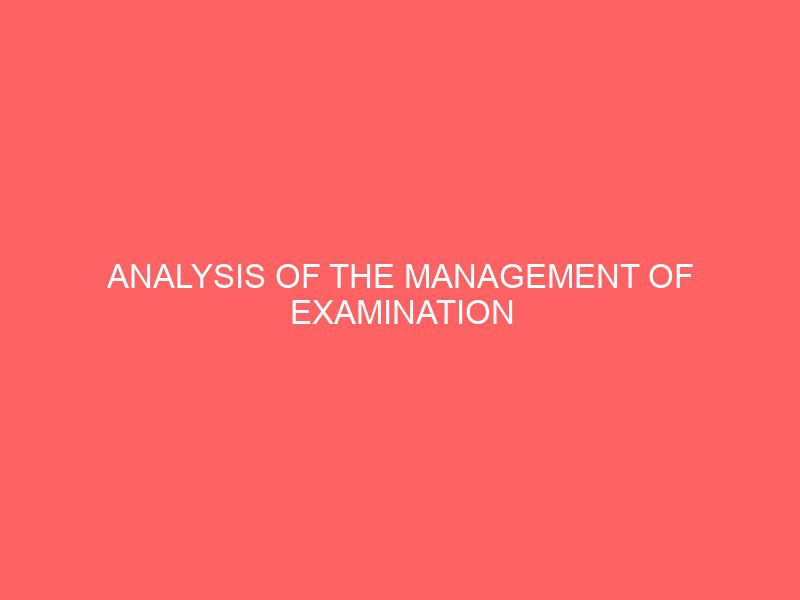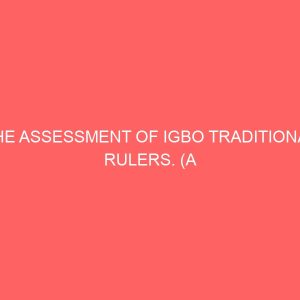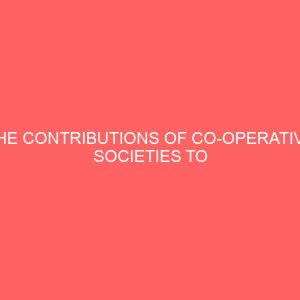Description
CHAPTER ONE
INTRODUCTION
1.1 Background to the Study
This project is on Analysis of the management of examination practice in Lafia metropolis. The value and functionality of any educational system lies in its ability to actualize the goals of education. In educational systems, world over, the examination process makes the difference. The goals of national educational systems and indeed national development become like a mirage if examination ethics is not encouraged and instituted (Nwadiani, 2005). Examination remains the best tool for an objective assessment and evaluation of what students have achieved after a period of schooling. Hence any action that undermines examinations poses a great threat to the validity and reliability of examination results and certification (Olatunbosun, 2009).
Unfortunately, the process of examination malpractice in Nigeria junior secondary schools has become a contemporary shame (Nwadiani, 2005). This is attributable to the high degree of examination malpractice that has become endemic in the educational system. Evidences abound of increasing involvement in examination malpractice by students, teachers and parents (Vanguard, 2005; Weekend Pointer, 2005; Daily Independent, 2004). Examination malpractice is any act of omission or commission by a person who in anticipation of, before, during or after any examination fraudulently secure any unfair advantage for himself or any other person in such a manner that contravenes the rules and regulations to the extent of undermining the validity, reliability and authenticity of the examination (Examination Act, 1999). The alarming rate of increase in examination malpractice in Junior Secondary Schools in Nigeria, calls for concern from all stake holders in the education sector. The incidence of examination malpractice is multidimensional in nature raging from smuggling of prepared notes into exams halls and classes (Adegoke, 2010). Examination malpractice is a scourge that has defied all 2 measures adopted to eradicate it from our educational system. It has continued to rear its ugly head in most examinations conducted in Nigeria from primary to the universities. In this light, this research seeks to Survey the management of examination management in Lafia Metropolis, Nassarawa State.
1.2 Statement of Problem
In view of the ever increasing incidences of examination malpractices and the problem associated with the conduct of examination in Nigeria, this study is undertaken to survey the potency of social studies education as a curriculum design in curbing examination malpractice among JSS students in Lafia Educational Zone, Nigeria. Of all the subjects studied in Nigerian schools, social studies is the most (if not the only) appropriate curriculum design for addressing Nigeria‘s problem educationally and comprehensively (Okam, 2002). This study is timely due to growing rate of examination malpractice in the educational industry in Nigeria today especially among junior secondary school students. Examination malpractice is one of the greatest problems undermining the foundation of educational practice in Nigeria. It renders the goals of education invalid. The actualization of the goals will continue to be a mirage if the scourge is not eradicated. Consequently, the fight against corruption cannot succeed if examination malpractice continues to be endemic in the Nigerian education system.
The incidence of examination malpractice in Nigeria has become so wide spread that there is virtually no examination anywhere at all levels and outside the formal school systems that there is no one form of sharp practice or the other. Every examination season witnesses the emergence of a new and ingenious ways of cheating. The alarming rate of increase of examination malpractice has been described as a global issue (Awanbor, 2005). The value system in Nigeria has broken down completely and so adults and youth 3 act without moral scruples. This is the reason why the menace (examination malpractice) still thrives unabated despite its grave consequences on the social, political and economic structures of the nation (Olatunbosun, 2009). The phenomenon of examination malpractice seems to be aggravated by the large scale and shameful involvement of dishonest and greedy teachers, school heads, parents and all those who take part in examination malpractice (Ijaiya, 1998). The prominence assumed by this malady in junior secondary schools has become a source of concern to stakeholders in the education industry. This study is unique and not a replica of anything in existence. It was designed from a unique perspective of exploring the management examination malpractice among junior secondary school students in Lafia Educational Zone, Nigeria.
1.3 Purpose of Study
The study sought to assess the management of examination malpractice in Lafia metropolis.
1.4 Objectives of the Study
The objectives of the study were to:
- Establish the factors which contribute to Examination Malpractices in Secondary Schools of Lafia metropolis.
- Explore the nature of Examination Malpractices used in secondary schools.
- Examine the effects of Examination Malpractices.
- Establish strategies to help curb Examination Malpractices.
1.5 Research Questions
What factors lead to Examination Malpractices in Secondary Schools of Uyo Metropolis?
- What is the nature of Examination Malpractices used in Secondary Schools?
- What are the effects of Examination Malpractices?
- What strategies can help in curtailing Examination Malpractices?
1.6 Significance of the Study
It was hoped that the findings of the study would generate information which policy makers and examining bodies could use to correlate with the already existing body of knowledge to curb Examination Malpractices. It would also help build confidence in our education system by producing graduates of substance who will in turn contribute effectively to the economic development of our country.
1.7 Delimitations
This study was conducted in secondary schools of Uyo metropolis, Akwa Ibom State.
1.8 Limitation of the Study
The validation of the research findings are threatened by one limitation which must be considered when interpreting and concluding the results. The respondents were only drawn from eight secondary schools when the ideal situation would have been to interview respondents from all the secondary schools in Uyo metropolis.
However, it is expected that the sample will be representative enough to come up with results that should harmonies with the available literature worldwide. Generalization of the findings would therefore still be acceptable.
1.9 Operational Definitions of Terms
The terms used in this study have the following meanings:-
Anomie Lack of purpose, identity or ethical values in a society. It also means rootlessness (Collins Concise Dictionary, 1978).
Decadence A process, condition or period of decline, deterioration or decay as in morals. (Collins Concise Dictionary, 1978)
Examination Malpractice An illegal act done by student, teacher, invigilator, supervisor, school administrator, parent or any public officer, before, during and after examinations in order for the pupil to be awarded undeserved marks. (Chapi, 2011)
Expedient Suited to the circumstances; convenient; based on what is of use or advantage rather than what is right or just; self-interest. (Collins Concise Dictionary, 1978)
Managing To direct or control the use of something; bringing something under control, to handle something efficiently.
Mercenaries People involved in examination malpractices for monetary gains.
Mutate To change.
Paradigm A pattern, example or model
Segregationist Discrimination
Strategy A plan of action designed to achieve a particular goal. A well planned series of actions for achieving an aim, especially success against a potent or challenge. ( Collins Concise Dictionary 1978)
Thematically Based on recurring, unifying subject or idea.
Unorthodox Unconventional, not conforming to the usual practice.
Vice An evil or wicked action, habit, depravity or corruption.








Reviews
There are no reviews yet.